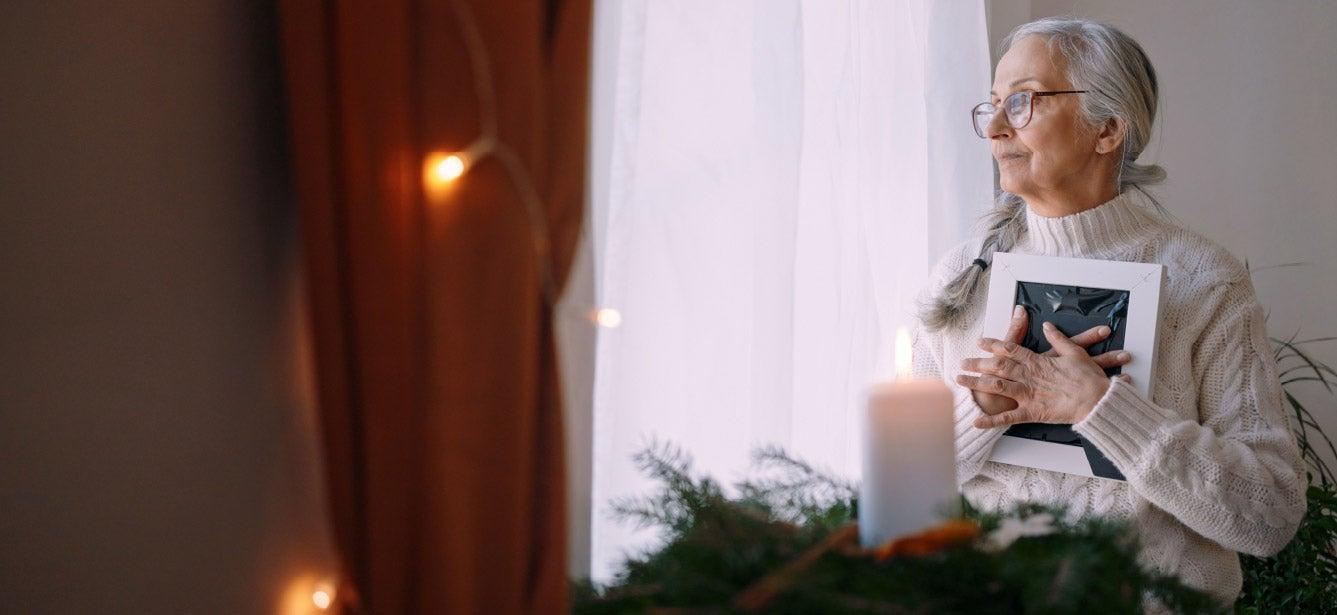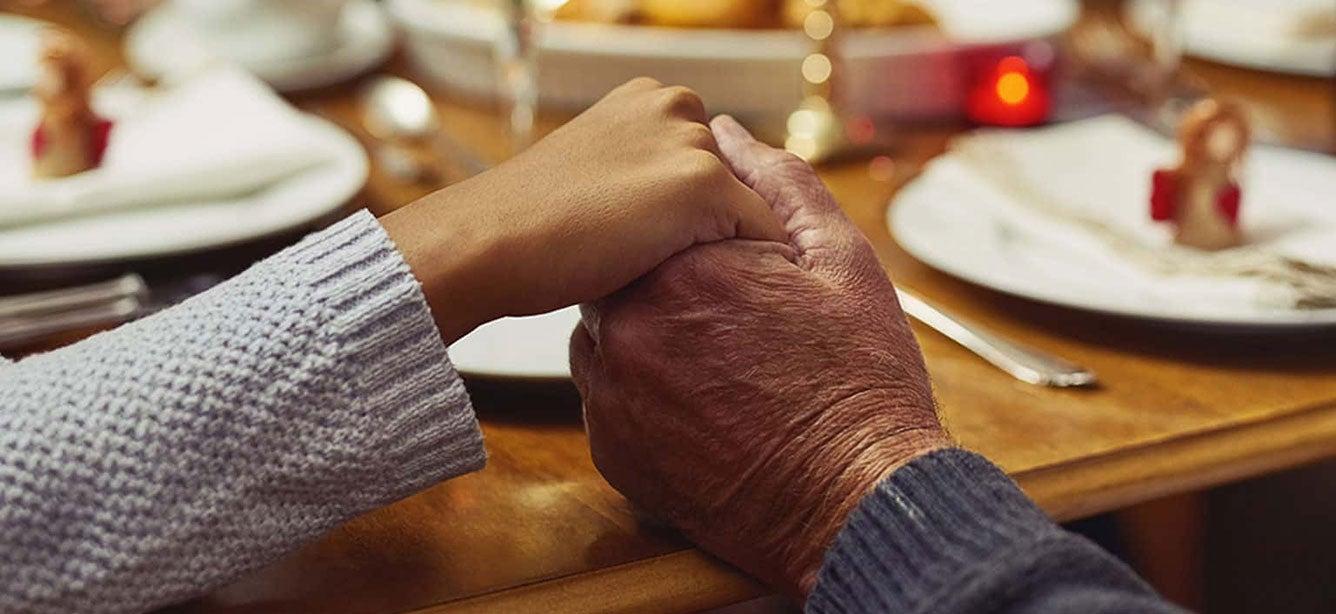
Related Topics
It can be difficult to know how to navigate grief at any point in time—there is no roadmap for grief, a variety of grief reactions exist, and grief can look very different from one loss to the next. At certain times, such as the holidays, grief might be heightened.1
As the holidays approach, grievers may find themselves bracing or feeling overwhelmed, anticipating how to handle gathering without the deceased loved one, fearing being saturated in grief, or questioning whether it is okay to celebrate and feel happy amidst loss.2 In contrast, they may find that their grief seems unusually quiet, but this, too, can bring a sense of unease.
There isn’t a “right” way to grieve or to experience grief around the holidays, but if you are experiencing challenges, the following coping approaches might bring support and comfort, leading to a more manageable or healthy holiday experience.
7 tips for navigating grief during the holidays
1. Learn about grief
Acknowledging feelings and understanding that grief is sometimes heightened around, during and immediately post-holidays can be reassuring, resulting in feeling less isolated in your grief or less like something is “wrong” with you. The absence of the loved one may feel particularly poignant at the first holiday gatherings. Recognizing this and acknowledging related feelings with others can be helpful. It’s also helpful to know that there are a variety of grief reactions, and each person has a right to their feelings. It’s important to have compassion for and avoid judgement of your own or others’ feelings, as everyone is navigating grief in their own way.
2. Express feelings
Expression is helpful for coping with grief. Concerns about the holidays can be explored with a trusted friend, family member, professional or support group. Feelings can also be expressed without speaking with others, though therapeutic writing activities. One such activity is to set a timer for three or more minutes and write out any thought that comes to mind, without censoring or judging feelings.3,4 The process may lead to insights or shift emotions.
Another helpful writing exercise is to write a letter to the deceased loved one. Express what you miss about them, and how you are feeling about experiencing the holidays without them. This exercise may bring a sense of connection to the loved one and can help to move stuck feelings.5
3. Be flexible with holiday traditions
Understandably, the holidays will feel different after a loved one has died, and all family members may need to manage expectations around traditions. It will be important to be flexible and creative with holiday traditions.6
For example, if a host who might typically cook for the family does not have energy to do so, shifting to a potluck meal might be helpful. If the person who died was in charge of a ritual, it will be important to either pass along the ritual to a different family member or create new rituals and traditions. Creating rituals to honor the loved one, such as sharing favorite memories, making one of their favorite foods, listening to one of their favorite songs, lighting a candle in their honor, or wearing clothes in their favorite color, can help to feel connected.
Traditions may change, but holiday gatherings can still bring a sense of connection and meaning, as well as an outlet for honoring the loved one.
4. Draw from past coping skills and advice
Previous coping skills with any loss in life can be helpful when experiencing grief during the holidays. It can be difficult to bring coping skills to mind in the moment when we need them, so keep a running list of coping approaches to draw from.
Many of us have blocks when it comes to giving advice to ourselves, yet we are able to give helpful advice to others. Pretend someone in your same position is standing in front of you, seeking support. What would you say to them? Write down what you would say to others so you can apply your own sage advice to yourself!
5. Take care of yourself
Grief often causes dysregulation in the body.7,8 It is essential to take care of yourself when grieving, yet it is easy to forget to do so. A checklist can help to make sure that healthy habits are implemented.
Make a list of actions that help to keep the body regulated, such as drinking water, getting fresh air, and eating meals, and a list of actions that can quickly bring a moment of calm, such as planting the feet on the ground and taking a few deep breaths or drinking a comforting cup of tea. Even two-minute actions can bring some relief, if done mindfully, with the intention to calm the body.9
When you are at a holiday event, personal self-care rituals can help to bring comfort, such as keeping a stone in your pocket and holding onto it in moments when comfort is needed. Or, when touching the stone, using it as a reminder to take a deep breath, and to relax any tension in the body. Keeping grounded in health can help create steadiness amidst the myriad of feelings during the holidays.
6. Hold conflicting feelings
You can avoid getting stuck in one feeling by allowing yourself to hold conflicting feelings together.6 It’s important to not judge your feelings and to remember that you can feel sad over the loss of your loved one while also feeling happy about gathering with other family members. Feeling happiness does not minimize the loss of the loved one and does not have to lead to suppressing sadness. We can hold many feelings and conflicting feelings at once and giving ourselves permission to do so can bring ease to the body and mind.
7. Plan ahead and set boundaries
As you anticipate any potential challenges around the holidays, you can gain a sense of control by planning ahead, thinking carefully about what you can and can’t handle and remembering that you have choices.6 For some people, the holidays will pose challenges, while for others, the holidays may be comforting. If visiting all day with others sounds overwhelming, you might decide to attend a gathering for a short time or not attend altogether. It’s not always easy to let others know that your own plans are changing, but you can practice ahead of time how to communicate what you need, and you can offer compassion and understanding to yourself and to others regarding decisions about the holidays.
By thinking ahead, you can recognize what you might need in order to enjoy the holidays. For example, you might find that small 10-minute breaks are needed to maintain energy, and you can plan to go on short walks during the gathering to rejuvenate.
If you don’t feel like you can say no to attending an event, or if it’s not realistic to say no, you can have a plan in place for unwinding and rejuvenating after the gathering.
Alternatively, you might find that thinking about the holidays brings joy and connectivity, and clarifying those feelings might help to cope with any uneasiness about the holidays. If you find that extra social support beyond the gathering helps, you can make plans to meet with others after the holiday event has ended.
It's important to be flexible and gentle with yourself. You might have a plan in place that changes. It’s okay to give yourself permission to re-assess. It can also help to let others know that you are feeling vulnerable or are still figuring out what you need as you navigate grief. Tell them you appreciate their understanding and flexibility.
Sources
1. Donna M. Wilson, et al. A scoping research literature review to map the evidence on grief triggers. June 5, 2021. Found on the internet at https://pubmed.ncbi.nlm.nih.gov/34157614/
2. Kenneth J. Doka. Grief is a Journey. Finding Your Path Through Loss. Atria. 2017
3. Natalie Goldberg. Writing Down the Bones: Freeing the Writer Within. Shambhala Publications. 2005.
4. Julia Cameron. The artist's way workbook. Penguin. 2006
5. Lene Holm Larsen. Letter Writing as a Clinical Tool in Grief Psychology. Omega (Westport). February 2022. Found on the internet at https://pubmed.ncbi.nlm.nih.gov/35156445/
6. Pauline Boss. Loss Trauma and Resilience. WW Norton & Company. 2006
7. Isabel Seliger. The biology of grief. The New York Times. April 22, 2021. Found on the internet at https://www.nytimes.com/2021/04/22/well/what-happens-in-the-body-during-grief.html
8. Claire Bidwell Smith. Anxiety: The missing stage of grief: A revolutionary approach to understanding and healing the impact of loss. Hachette UK. 2018
9. Emily Gurnon. Funeral planning in the time of COVID-19. Next Avenue. April 7, 2020. Found on the internet at https://www.nextavenue.org/funeral-planning-coronavirus/


